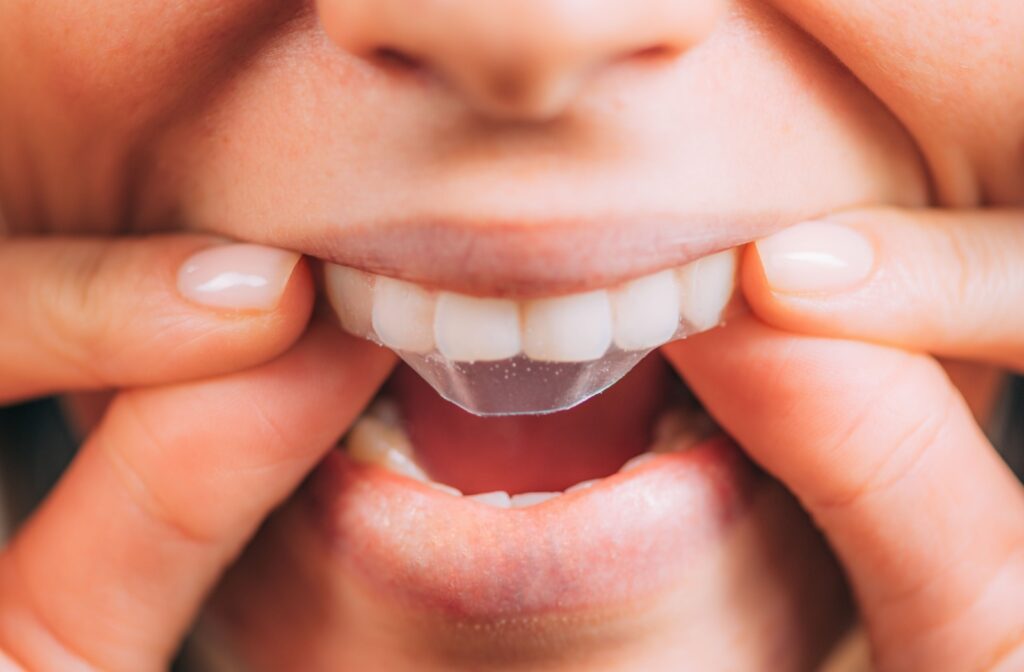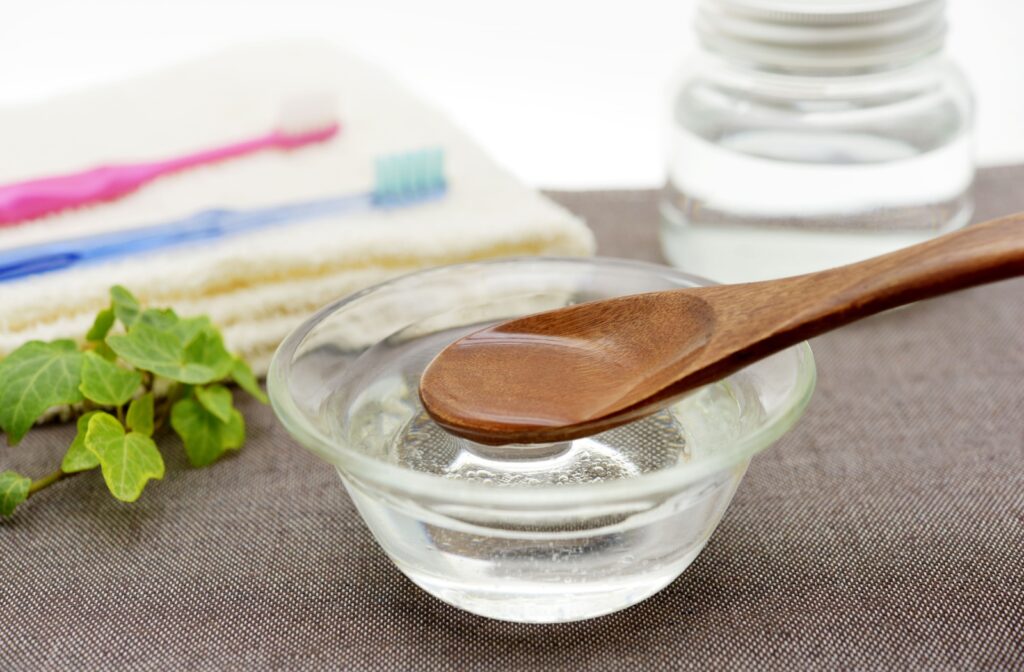Bright, pearly white teeth are often seen as the hallmark of a healthy, radiant smile. But with so many teeth-whitening claims circulating online, it can be challenging to figure out what works and what doesn’t. One natural remedy that has generated plenty of buzz is coconut oil. You’ve probably heard about its uses for skincare and haircare—so, can coconut oil whiten teeth, too?
While there is a long history of using coconut oil for oral health in places like India, there isn’t enough scientific research or evidence to support the claim that coconut oil whitens teeth. Fortunately, coconut oil is unlikely to cause any harm to your gums or teeth, so you’re welcome to try this method if you’re curious. However, if you’re serious about wanting whiter teeth, talk to your dentist about other options.
History of Coconut Oil in Teeth Whitening
Coconut oil is associated with oral health through an ancient practice called “oil pulling,” which has roots in Ayurvedic medicine. This traditional practice involves swishing oil (typically sesame, sunflower, or coconut oil) in the mouth for 10–20 minutes before spitting it out.
The goal? Coconut oil allegedly supports oral hygiene by “pulling out toxins,” removing bacteria, and promoting healthier gums and teeth. Advocates claim that it benefits oral health and contributes to whiter, shinier teeth over time.
Can Coconut Oil Whiten Teeth?
Here’s the thing—coconut oil doesn’t contain bleaching or whitening chemicals, meaning it won’t whiten teeth the same way hydrogen peroxide-based products do. However, oil pulling with coconut oil could indirectly maintain a whiter smile by reducing harmful bacteria in the mouth.
Coconut oil may also help prevent plaque buildup, thereby reducing staining of the teeth. The lubricating effects of coconut oil may also reduce surface stains, offering a slightly brighter appearance.
While there’s no harm in trying coconut oil as part of your oral care routine, don’t expect a miracle transformation. Think of it as oral hygiene maintenance rather than a full-blown whitening solution.
How to Use Coconut Oil to Whiten Teeth (If You Want to Try)
Want to give coconut oil a shot? Here’s how you can safely integrate oil pulling into your dental care routine:
- Choose High-Quality Coconut Oil: Go for organic, unrefined coconut oil for the best results. It’s free of additives and maintains its natural properties.
- Take the Right Amount: Use about one tablespoon of coconut oil. It may feel like a lot at first, so if you’re new to oil pulling, start with a teaspoon and gradually increase.
- Swish for 15–20 Minutes: Swish the oil around your mouth, ensuring it reaches all areas. Don’t swallow it—the oil will now contain bacteria and debris from your mouth.
- Spit It Out Properly: Spit the oil into a trash can (not your sink! Coconut oil can solidify and clog your plumbing).
- Rinse and Brush: Rinse your mouth with warm water and brush your teeth as usual.
For best results, try oil pulling before breakfast in the morning and combine it with other effective oral hygiene habits.
Teeth-Whitening Solutions With Scientific Merit
If you’re looking for noticeable teeth-whitening results, coconut oil might not be your one-stop solution. Thankfully, other options backed by science can help you achieve visibly whiter teeth.
At-Home Whitening Options

- Fluoride Toothpaste: A good fluoride toothpaste can help remove stains and strengthen enamel, resulting in a healthier, whiter appearance.
- Whitening Mouthwash: Many whitening mouthwashes contain hydrogen peroxide or other gentle whitening agents to help brighten your teeth over time.
- Whitening Strips/Pens: These over-the-counter treatments use peroxide-based formulas to lift surface and deep stains. They’re affordable and effective with consistent use.
- Baking Soda: This natural abrasive helps remove surface stains and neutralize acids in the mouth. Use it sparingly by brushing with a baking soda paste a few times a week to avoid enamel damage.
(is it worth mentioning baking soda here as a home alternative? Or is that a whole other blog?)
Professional Whitening Treatments
Consider in-office whitening performed by a dental professional for faster, longer-lasting results.
- Laser Whitening: A dentist applies a peroxide gel to your teeth and activates it with a special light or laser. This treatment delivers dramatic results in just one session.
- Custom Whitening Trays: Your dentist creates personalized trays with whitening gel tailored to your needs. These can often be used at home for gradual whitening.
Professional options are more powerful, and, while they come with a higher price tag, the results can last much longer than DIY methods.
Balancing Whiteness with Health
While having a bright smile is terrific, it’s equally important to prioritize oral health. Overuse of whitening treatments—whether natural or chemical-based—can lead to increased sensitivity and enamel erosion.
To strike the perfect balance between white teeth and dental health, keep these tips in mind:
- Brush twice daily with fluoride toothpaste.
- Floss daily to remove plaque and prevent staining between teeth.
- Limit staining agents like coffee, tea, and red wine (or sip through a straw to minimize contact).
- Visit your dentist regularly for check-ups and professional cleanings.
Chat with your dentist if you’re curious but unsure which teeth-whitening method to try. Your dentist can recommend a personalized solution based on your goals and oral health status.
Are White Teeth the Sign of Healthy Teeth?
While bright white teeth are often seen as an indicator of good oral health, it’s important to note that colour doesn’t tell the whole story. The outermost layer of your teeth, the enamel, is naturally off-white and slightly translucent. This translucency reveals the layer of dentin beneath, which itself has a yellowish tone. Overly white teeth from aggressive whitening treatments can weaken enamel if not done correctly.
Instead of focusing solely on whiteness, prioritize habits that support oral health, such as proper cleaning, regular dental visits, and eating a balanced diet rich in nutrients for strong teeth and gums. A healthy smile goes beyond aesthetics!
A Cleaner, Brighter Smile Is Within Reach
Can coconut oil whiten teeth? While it likely won’t lead to Hollywood-white transformations, it may support your oral care routine by reducing bacteria and preventing plaque buildup. Pair it with scientifically proven whitening solutions and solid dental habits for the best results. Genesis Dental understands the pressure to look attractive with movie-screen-ready white teeth. Contact us today to see how we can help you reach your smile goals while prioritizing your oral health.




